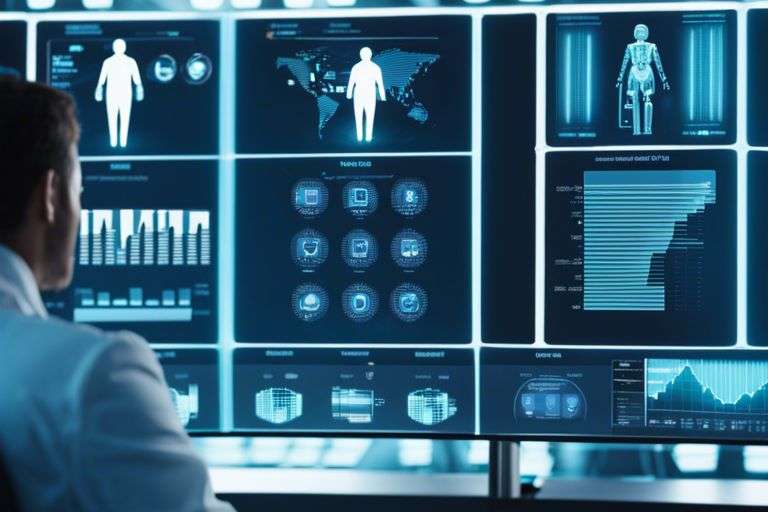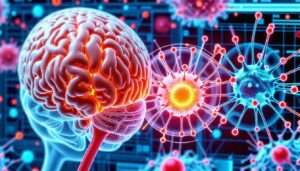Embrace the power of artificial intelligence (AI) to revolutionize the way predictive analytics is used in the healthcare industry. With AI-driven predictive analytics, you can tap into a wealth of patient data to anticipate and prevent potential health issues, leading to early intervention and improved patient outcomes. By harnessing the predictive capabilities of AI, you can identify patterns and trends that may go unnoticed by traditional methods, allowing for more personalized and effective treatment plans. However, it’s crucial to carefully navigate the ethical and privacy considerations that come with utilizing AI in healthcare. This blog post will delve into the benefits, challenges, and ethical implications of leveraging AI for predictive analytics in the healthcare sector.
Key Takeaways:
- Improved Patient Outcomes: AI-powered predictive analytics can help healthcare providers to identify potential health risks and provide proactive care to patients, leading to improved outcomes and better overall health.
- Efficient Resource Allocation: By utilizing AI for predictive analytics, healthcare organizations can better allocate resources, such as staff and equipment, to areas with higher predicted patient needs, leading to more efficient operations.
- Early Disease Detection: AI can analyze a large amount of patient data to identify patterns and potential risk factors for diseases, allowing for early detection and intervention, ultimately leading to better patient outcomes.
- Personalized Treatment Plans: With AI-powered predictive analytics, healthcare providers can develop personalized treatment plans for patients based on their individual health data, leading to more effective and targeted care.
- Reduced Healthcare Costs: By predicting and preventing potential health issues, AI can help reduce healthcare costs for both providers and patients by minimizing the need for expensive treatments and hospitalizations.
Fundamentals of AI in Healthcare
Now, more than ever, harnessing AI for predictive analytics in healthcare is crucial for improving patient outcomes and advancing medical research. Artificial intelligence has the potential to revolutionize the way healthcare is delivered by enabling more accurate diagnoses, personalized treatment plans, and proactive disease prevention. A recent study published in Nature showed the significant impact of harnessing the power of synthetic data in healthcare, demonstrating the potential of AI to transform the industry.
Key Technologies and Algorithms
AI in healthcare relies on a range of technologies and algorithms to process and analyze complex medical data. Machine learning, deep learning, natural language processing, and computer vision are some of the key technologies driving predictive analytics in healthcare. These sophisticated algorithms can identify patterns, detect anomalies, and make predictions based on vast amounts of healthcare data, ultimately improving the accuracy and efficiency of clinical decision-making.
Data Sources and Quality
When harnessing AI for predictive analytics in healthcare, the quality and diversity of data sources are crucial for ensuring the reliability of insights and predictions. Your healthcare data may come from electronic health records, medical imaging, wearable devices, genomics, and patient-generated data. It’s essential to ensure that the data you are using is comprehensive, accurate, and up-to-date to prevent biases and ensure the effectiveness of AI-driven predictive analytics in healthcare. Additionally, ensuring data security and privacy is a critical aspect of utilizing AI in healthcare to maintain patient trust and confidentiality.
Applications of Predictive Analytics
Clearly, the applications of predictive analytics in healthcare are vast and far-reaching. By harnessing the power of AI, you can gain invaluable insights into healthcare data, leading to significant improvements in patient care, operational efficiency, and overall outcomes.
Disease Prevention and Management
Predictive analytics allows you to identify individuals who are at high risk for certain diseases, enabling you to intervene early and prevent the onset of the condition. By analyzing a wide range of data, including genetic information, lifestyle factors, and environmental influences, you can develop personalized interventions that can dramatically reduce the risk of developing chronic conditions such as diabetes, heart disease, and cancer. Additionally, predictive analytics can help you better manage existing conditions by anticipating potential complications and adjusting treatment plans accordingly.
Personalized Treatment Plans
With the help of predictive analytics, you can create personalized treatment plans tailored to the specific needs of each patient. By analyzing a multitude of factors, including genetic markers, medical history, and response to previous treatments, you can determine the most effective course of action for each individual, maximizing the chances of successful outcomes while minimizing the risk of adverse reactions. This approach not only improves patient care but also contributes to more cost-effective and efficient use of healthcare resources.
Operational Efficiency in Healthcare Systems
By leveraging predictive analytics, you can optimize the operational efficiency of healthcare systems. This can include predicting patient admission rates, optimizing staff schedules, and identifying potential bottlenecks in the delivery of care. Additionally, predictive analytics can help you anticipate equipment maintenance needs, manage inventory levels, and streamline administrative processes. By proactively addressing these operational challenges, you can enhance the overall quality of care while controlling costs and ensuring a more seamless healthcare experience for patients.
Ethical Considerations and Challenges
Despite the many benefits of AI in healthcare predictive analytics, there are important ethical considerations and challenges that must be addressed in order to ensure the responsible and effective use of this technology. As the use of AI continues to grow in healthcare, it is crucial to consider the ethical implications that arise from its implementation.
Privacy and Data Security
One of the primary ethical concerns surrounding AI in healthcare predictive analytics is the issue of privacy and data security. As AI systems collect and analyze vast amounts of sensitive patient data, there is a risk of unauthorized access and potential breaches. It is essential to establish strong protocols and safeguards to protect patient privacy and data security. Your healthcare organization must prioritize the implementation of robust encryption methods and access controls to mitigate these risks and protect the sensitive information of your patients.
Equity and Access to AI-enhanced Care
Another critical ethical consideration is the potential for AI-enhanced care to exacerbate existing healthcare disparities. As AI-driven predictive analytics are integrated into healthcare decision-making processes, there is a risk of bias and inequity in the delivery of care. It is essential to carefully monitor and address these issues to ensure that AI technology is used in a manner that promotes equitable access to care for all patients. Your organization should prioritize the development of AI algorithms that are designed to mitigate bias and ensure fair and equitable treatment for all individuals, regardless of their background or demographic characteristics.
By carefully considering these ethical considerations and challenges, and proactively addressing them, you can harness the power of AI for predictive analytics in healthcare while upholding the highest ethical standards and promoting positive patient outcomes.
Future Directions and Innovations
After learning about the current applications of AI in predictive analytics for healthcare, you may be wondering what the future holds for this field. The potential for innovation and growth in this area is vast, with new technologies and methodologies constantly being developed. If you are interested in diving deeper into the future outlook of AI in healthcare, I highly recommend reading the article “Harnessing the Power of AI in Healthcare: Innovations and Future Outlook” for a comprehensive overview.
Integrating Genomics and AI
One exciting area of future innovation in healthcare is the integration of genomics and AI. Genomics, the study of an organism’s entire DNA sequence, has the potential to revolutionize personalized medicine. When combined with the predictive power of AI, the possibilities for identifying and treating genetic predispositions to diseases are immense. Harnessing the power of AI to analyze and interpret vast genomic data sets can lead to highly personalized and effective treatment plans for individuals based on their unique genetic makeup.
The Role of AI in Pandemic Response
Another crucial area where AI is expected to play a significant role in the future is in pandemic response. As evidenced by the COVID-19 pandemic, the ability to quickly and accurately predict the spread of infectious diseases is of paramount importance. AI can analyze vast amounts of data, including epidemiological information, social media trends, and healthcare records, to predict the spread and impact of pandemics. Furthermore, AI can aid in the development of vaccines and treatments by rapidly analyzing potential drug candidates and simulating their effects on the human body, significantly accelerating the response time to future pandemics.
Harnessing AI for Predictive Analytics in Healthcare
Presently, you have learned about the potential of AI in revolutionizing predictive analytics in healthcare. By harnessing AI technologies, healthcare professionals can gain valuable insights from vast amounts of data to predict patient outcomes, identify at-risk populations, and personalize treatment plans. This can lead to more proactive and effective healthcare interventions, ultimately improving patient outcomes and reducing healthcare costs. As AI continues to advance, it is essential for healthcare organizations to embrace these technologies and invest in the necessary infrastructure to fully leverage the power of predictive analytics in healthcare. By doing so, you can stay at the forefront of innovation and improve the quality of care for your patients.
FAQ
Q: What is predictive analytics in healthcare?
A: Predictive analytics in healthcare is the use of advanced statistical and analytical techniques to make predictions about patient outcomes, prevent potential problems, and improve overall patient care based on historical and current data.
Q: How can AI be harnessed for predictive analytics in healthcare?
A: AI can be harnessed for predictive analytics in healthcare through the use of machine learning algorithms that can analyze vast amounts of data to identify patterns, trends, and potential risks. AI can also automate the process of identifying at-risk patients and suggesting personalized treatment plans.
Q: What are the benefits of harnessing AI for predictive analytics in healthcare?
A: The benefits of harnessing AI for predictive analytics in healthcare include improved patient outcomes, reduced healthcare costs, early identification of potential health issues, personalized care plans, and more efficient healthcare delivery.
Q: Are there any challenges or limitations to using AI for predictive analytics in healthcare?
A: Some challenges include the need for high-quality data, privacy concerns related to patient data, and the potential for bias in algorithms. Additionally, healthcare professionals need to be trained to understand and interpret the results of predictive analytics to ensure effective and ethical use.
Q: How can healthcare organizations implement AI for predictive analytics effectively?
A: Healthcare organizations can implement AI for predictive analytics effectively by developing a clear strategy, investing in data infrastructure, ensuring data quality and security, involving healthcare professionals in the process, and continuously evaluating and improving the predictive analytics models and algorithms.




